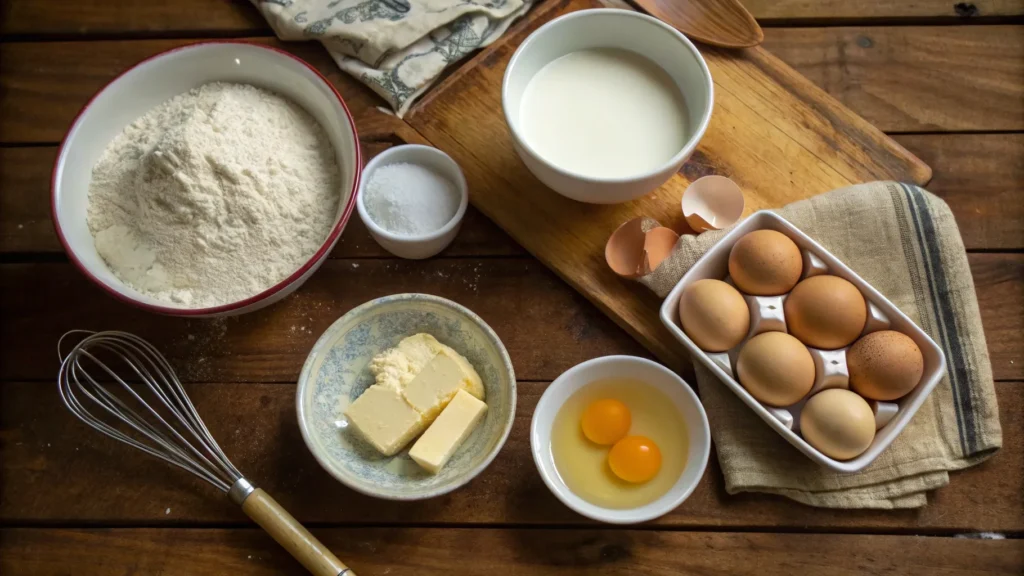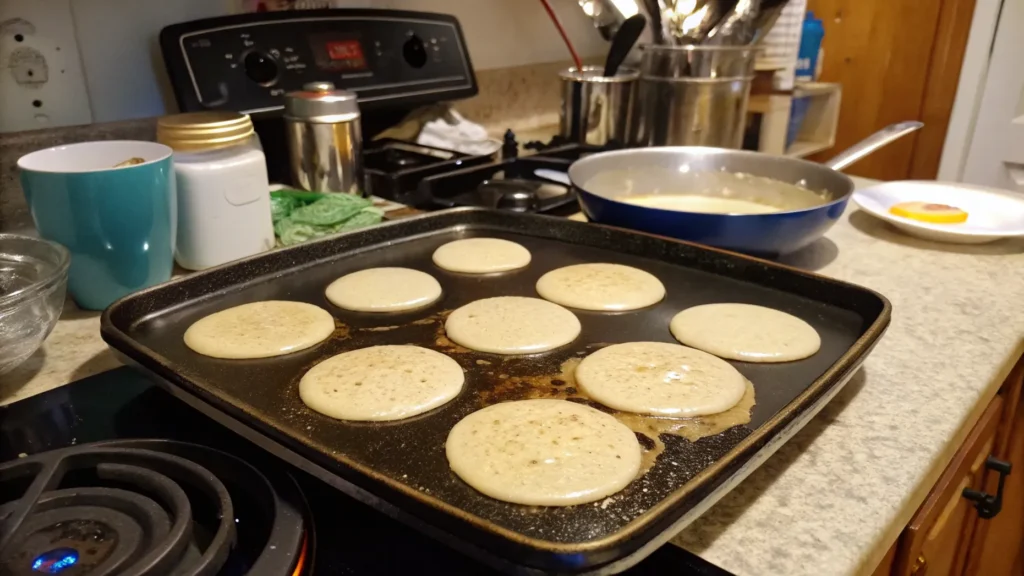Making mini pancakes should be an easy and enjoyable way to savor a fun, bite-sized breakfast treat. However, when your pancakes turn out tough instead of light and fluffy, it can feel incredibly frustrating! In fact, a variety of small missteps—such as overmixing the batter or using the wrong cooking temperature—can easily lead to less-than-ideal results.
To help you out, this article delves into the most common reasons why mini pancakes turn out hard and shares practical, expert-backed solutions to fix these issues. Whether you’re a seasoned pancake pro or trying your hand at them for the first time, these tips will help you whip up perfectly light and tender mini pancakes every single time.
Why are my mini pancakes hard? Common Causes
Overmixing the Batter
When it includes pancakes, much less mixing is greater! Overmixing the batter develops gluten, which is awesome for bread however terrible for pancakes. Gluten offers bread its chewiness, however in pancakes, it effects in a dense, rubbery texture.
- Why overmixing happens: It is tempting to mix until your batter seems flawlessly clean. However, aiming for a lump-unfastened batter can overwork the gluten inside the flour.
- How to avoid it: Mix the materials simply until combined. A few lumps are first rate—they will paintings themselves out throughout cooking. Using a spatula in preference to a whisk can assist reduce overmixing.
Incorrect Ingredient Measurements
Too a great deal flour or not sufficient liquid may want to make your mini pancakes dry and difficult to flip. On the alternative hand, an excessive amount of liquid can motive pancakes that do not cook dinner frivolously.
- Why specific measurements rely: Pancake recipes depend upon the proper stability of wet and dry materials for a gentle texture. Even a moderate deviation can throw this stability off.
- Solution: Use measuring cups and spoons for accuracy. For flour, spoon it into the measuring cup and degree it off with a knife to keep away from packing in extra.
Using Cold Ingredients
Cold additives, like milk or eggs immediately from the fridge, can purpose uneven blending and batter that doesn’t cook dinner well.
- The trouble with bloodless substances: Cold beverages prevent the dry additives from being incorporated because of uneven textures and tricky pancakes.
- Quick fix: Let your milk and eggs sit out for 15–20 mins before mixing. Suppose you are in a hurry; heat milk slightly within the microwave and area the eggs in a bowl of hot water.

Cooking on the Wrong Temperature
Cooking your pancakes on warmth it truly is too immoderate or too low could make or damage their texture.
- What happens with excessive heat: The out of doors prepare dinner too quickly, leaving the internal undercooked and dense.
- What occurs with low heat: The pancakes take too lengthy to put together dinner, drying out and turning hard.
- Solution: Preheat your pan over medium warmth. A quick check is to sprinkle some drops of water at the ground—in the event that they sizzle and evaporate inside seconds, the pan is prepared.
By addressing those commonplace mistakes, you can keep away from the pitfalls of difficult mini pancakes and experience smooth, scrumptious bites that everyone will love.
Solving the Problem: Why are my mini pancakes hard?
Creating tender, fluffy pancakes isn’t magic—it’s a combination of clever techniques and small, thoughtful adjustments. If you’re still wondering, “Why are my mini pancakes difficult?” don’t worry! Fortunately, there are several tried-and-true solutions that can completely transform your pancake-making experience. By applying these tips, you’ll be on your way to enjoying soft, delicious mini pancakes every time.
Adjusting the Mixing Technique
Why Lumps Are Your Friends
Although it may appear counterintuitive, a slightly lumpy batter is essential to fluffy pancakes. Over-smoothing can enhance the gluten, making the pancakes dense and chewy.
Folding vs. Whisking
- Folding: Gently fold your moist and dry substances collectively the usage of a spatula. This approach minimizes gluten formation.
- Whisking: Reserve whisking for moist elements earlier than combining with the dry blend. This step ensures even distribution with out overmixing.
Tweaking the Recipe
Adding Moisture with Milk or Yogurt
If your batter feels too thick or dry, upload a milk splash or a yoghurt dollop. These components enhance texture and beautify the richness of the pancakes.
Incorporating Melted Butter or Oil
Fat is your buddy in pancakes. Too little can bring about dry, tough pancakes. To keep your pancakes mild, use melted butter or a neutral oil like canola.
Letting the Batter Rest
Benefits of Resting Time
Resting the batter lets in the flour to completely hydrate and the gluten to loosen up, stopping durability. Even a short 10-minute relaxation could make a substantial difference.
How Long to Rest the Batter
For brilliant results, permit your batter to loosen up for 10–15 minutes. If you have the time, a 30-minute relaxation can yield even better results.
Using Fresh Ingredients
Fresh Leavening Agents
Old baking powder or soda won’t produce the elevate your pancakes want, leading to denser results. Always test the expiration date!
Avoiding Stale Ingredients
Using stale flour or antique blend-ins can alter the flavor and texture of your pancakes. Opt for fresh, high-quality additives for superb effects.
You can discover this mini pancake recipe guide for added pancake-making pointers.
Expert Tips for Fluffy Mini Pancakes
Now that we have tackled the why, allow’s move on to the how. Here’s how to boom your pancake sport and keep away from asking, “Why are my mini pancakes hard?” once more.
Choosing the Right Pan
Best Materials for Even Cooking
Non-stick skillets and solid iron griddles are pancake heroes. They heat flippantly, preventing heat spots, which could cause inconsistently cooked pancakes.
When to Grease the Pan and with What
Too a lot oil or butter can fry the pancakes’ edges, making them crispy in preference to so alternatively regularly. Lightly grease your pan with a thin layer of butter or cooking spray, and wipe away extra.
Monitoring Cooking Time
Knowing When to Flip
Bubbles forming on the pancake floor are your cue to turn. Wait till the rims appear set and dry—flipping too early can motive a large number!
Preventing Overcooking
Overcooked pancakes are dry and tough. For golden perfection, intention to cook each facet for 1–2 mins on medium warmth.
Incorporating Extra Fluffiness

Whipping Egg Whites
For a further raise, separate your egg whites, whip them to smooth peaks, and fold them into the batter. This gives airiness and makes your pancakes soften for your mouth lightly.
Using Buttermilk for Added Rise
The acidity in buttermilk reacts with baking soda to create a light, fluffy texture and enhances the overall flavor. If buttermilk isn’t readily available, you can easily mix regular milk with a splash of vinegar or lemon juice to achieve a similar effect.
By applying these expert tips, you’ll never have to worry about serving tough pancakes again. Eager to learn more? Get ready to dive into FAQs and advanced pancake-making techniques in the next section!
FAQs about: Why are my mini pancakes hard?
Mini pancakes are a favorite in many households, but occasionally, issues pop up that leave you wondering, “Why are my mini pancakes hard?” In this section, we’ll address some common questions about mini pancake challenges and provide practical solutions to help you avoid these problems in the future.
Why Are My Pancakes Coming Out Hard?
Key Reasons for Hard Pancakes
The primary culprits are usually overmixing the batter, using too much flour, or cooking at the wrong temperature. Pancakes are delicate and require the right balance of ingredients and techniques to remain soft and fluffy.
Quick Fixes to Try
- Mix simply until mixed, leaving some lumps.
- Measure your components accurately to avoid a dry batter.
- Preheat your pan to medium warmth for even cooking.
How Long Do You Cook Mini Pancakes For?
Ideal Cooking Times
Mini pancakes normally require about 1–2 mins on each factor. Wait for bubbles to seem on the ground and the rims to appear set before flipping.
Avoiding Overcooking
Cooking for too lengthy can dry out your pancakes, making them tough. Stick to medium warmth and display screen closely to make sure the best texture.
How Do You Soften Hard Pancakes?
Reheating Tricks
If your pancakes have become hard, try reheating them in the microwave for 10–15 seconds with a damp paper towel. This simple method helps restore some of the lost moisture, making them soft and enjoyable again.
Using Syrups or Toppings
Adding butter, syrup, or fruit toppings could make difficult pancakes flavor higher by using overlaying dryness.
How Do You Make Pancakes Not Hard?
Prevention Tips
- Use easy components like baking powder or soda for the ideal upward push.
- Allow the batter to rest earlier than cooking to relax the gluten.
- Incorporate fats, like butter or oil, to beautify moisture.
Test this mini pancake recipe manual for extra suggestions on making the ideal pancakes.
Advanced Pancake Techniques and Innovations
If you’ve mastered the basics but still find yourself asking, “Why are my mini pancakes hard?” it might be time to experiment with advanced techniques. With a few strategic tweaks and creative methods, you can elevate your pancake-making skills to the next level and consistently achieve perfectly tender, fluffy results. Let’s explore how!
Experimenting with Ratios
How Adjustments Affect Texture
A small exchange in the liquid-to-flour ratio can dramatically affect pancake texture. Slightly thinner batter leads to softer, more sensitive pancakes.
Substituting Ingredients
Consider using alternatives like almond milk for a nutty flavor or flaxseed meal for an added boost of nutrients. Both options contribute to a distinctive and moist texture, enhancing the overall pancake experience.
Using Specialty Equipment
Pancake Makers and Griddles
Electric pancake makers can help obtain consistent results with the aid of dispensing warmth frivolously and retaining the proper temperature. Griddles are also first-rate for cooking multiple pancake right away.
Comparing Stovetops vs. Electric Griddles
While stovetop cooking gives more manage, electric powered-powered griddles are foolproof for novices.
Creating a Personalized Pancake Recipe
Incorporating Unique Flavors
Add cinnamon, vanilla extract, or mashed bananas to create a custom flavour profile.
Testing and Adjusting
Experiment with different ingredient combinations and cooking techniques to discover your perfect pancake recipe. Whether it’s adding unique flavors or testing new methods, the possibilities are endless.
If you’re feeling adventurous, explore some fun and creative twists with our blueberry banana pancakes guide.
With these advanced techniques, you’ll never have to ask, “Why are my mini pancakes tough?” again. Perfect, fluffy pancakes are just a few tweaks away!
How Environmental Factors Affect Pancake Texture
Many people often overlook how environmental factors can significantly impact the outcome when making the best mini pancakes. For this reason, here’s a more in-depth look at exactly how to manage these external influences effectively.
Humidity and Flour Absorption
High humidity can motive flour to absorb greater moisture, main to a thicker batter that could bring about difficult pancakes.
- Tip: On humid days, begin with barely much less flour and add regularly till the batter reaches the desired consistency.
- Why this issue: Maintaining the right wet-to-dry ratio is high to warding off dense pancakes.
Altitude and Cooking Adjustments
If you are cooking at high altitudes, you could find out that your pancakes don’t push upward as expected, ensuing in a tougher texture.
- Adjusting the recipe: Reduce the leavening shops barely and add a chunk of greater liquid to account for lower air pressure.
- Cooking time recommendations: At better altitudes, cook pancakes on barely decreased heat to permit them to push upward nicely in advance than the outdoor units.
Pancake Troubleshooting Guide
Even with careful education, pancakes can nevertheless pass incorrect. If you’re questioning, “My mini pancakes are hard,” this troubleshooting guide can assist pinpoint the trouble.
Common Mistakes and Their Fixes
Overcooked or Burnt Pancakes
- What takes area: Cooking at high warm temperature can char the out-of-doorways while leaving the internal dry and difficult.
- Solution: Always preheat the pan and use medium warmth. Test the pan with some drops of water to make sure it’s ready.
Uneven Pancakes
- What takes place: Uneven cooking ends in a few additives of the pancake being hard and others gentle.
- Solution: Use a griddle or pan with even warmness distribution and pour consistent portions of batter to gain uniform sizes.
Batter Too Thick
- What takes location: A thick batter produces heavy, dense pancakes that don’t cook lightly.
- Solution: Add a touch of milk or water to thin out the batter without compromising the flavor.
With these practical insights into environmental factors and troubleshooting, you’ll be fully equipped to overcome any pancake mishap. For even more tips and delicious recipes, be sure to check out our mini pancake recipe guide.


3 thoughts on “Why Are My Mini Pancakes Hard? Tips for Fluffy Pancakes”